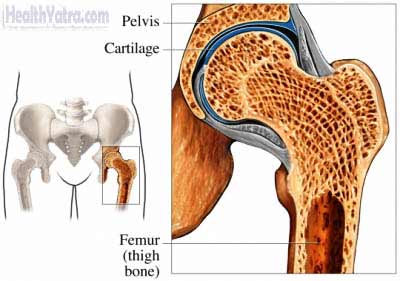Definition
A hip labral tear is an injury to the cartilage inside the hip joint. The hip joint is made of a ball and socket. The ball is the end of the thigh bone, also called the femur. This ball fits into the bowl-shaped socket in the pelvic bone, also called the acetabulum. Cartilage lines the socket to keep movement smooth and the joint cushioned. When the cartilage tears, it is called a hip labral tear.

If you suspect you have this condition, contact your doctor right away.
Causes
Hip labral tears can result from wear and tear or from an injury. Causes may include:
- Wear and tear of hip joint from different activities, such as golf or softball
- Traumatic injury to hip
- Twisting injuries
- Motor vehicle accident
- Degenerative diseases like osteoarthritis
Risk Factors
Factors that can increase your chances of getting a hip labral tear include:
- Femoroacetabular impingement syndrome (FAI)
- Legg-Calve-Perthes disease
- Hip dysplasia
- Osteoarthritis
- Trauma to hip
- Slipped capital epiphysis
- Capsular laxity/hip hypermobility
Symptoms
Symptoms vary and can be mild, including:
- Hip pain: sharp, deep, disabling
- Locking or clicking of hip
- Hip instability
- Limited range of motion
- Tenderness to touch
- Groin, buttock, or thigh pain
- Pain during activity
Diagnosis
Your doctor will ask about your symptoms and medical history. A physical exam will be done. You will likely be referred to a specialist. An orthopedic surgeon focuses on bones and joints.
Images may need to be taken of your hip. This can be done with:
- Magnetic resonance imaging (MRI) arthrography
- X-rays
An anesthetic may be injected to help diagnose this condition.
Treatment
Talk with your doctor about the best plan for you. Treatment options include the following:
Medical Treatment
Common medical treatment may include:
- Nonsteroidal anti-inflammatory drugs (NSAIDs)
- Steroid injection to the joint
- Modified activity
- Physical therapy to strengthen muscles
Generally, this treatment is tried for several weeks. If there is no improvement, then surgery is considered.
Surgical Treatment
Arthroscopy uses a thin, lighted tube inserted through a small incision to view the injury and fix it. Small instruments are threaded through this tube. The torn cartilage may be removed or sewn together.
Rehabilitation
After surgery, you may be fitted with a brace. This will provide support and aid healing. A therapist will work with you. The therapy will include strength exercises and a plan to increase your weight bearing.
Prevention
There are no known guidelines to prevent a hip labral tear.
